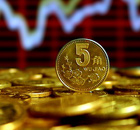Global General
At least 7 blasts rip through Baghdad, killing 49
(Agencies)
Updated: 2010-04-07 02:35
 |
Large Medium Small |
College student Ali Hussein, 22, was riding the bus to school when one of the Shula bombs exploded. He described "people running in different directions with fear."
"Cars began to collide with one another in the street because of fear," said Hussein, who fled for home after the blast. "We saw a cloud of fire and black smoke rising from a building at the explosion site, and while we were terrified by this explosion, another one took place."
A few minutes later, at 9:45 am a bomb left in a plastic bag exploded at a restaurant in the Allawi district downtown, near the Culture Ministry. Dozens of people gathered at the bomb site in the hours after the explosion, digging through bricks in the hopes of finding survivors.
Several hours later, a parked car bomb exploded in a market, killing six civilians, police and hospital officials.
The bombings were the fourth set of attacks with multiple casualties across Iraq in five days.
On Monday, a Shiite couple and four of their children were gunned down in their home outside Baghdad, while more than 40 were killed Sunday after suicide attackers detonated three car bombs near embassies in Baghdad. On Friday, gunmen went house-to-house in a Sunni area south of Baghdad, killing 24 villagers execution-style.
US military and diplomatic officials have sought to downplay the possibility that Iraq is heading back down the path toward sectarian bloodshed.
"We're obviously concerned but we don't see the parallels with what happened a few years ago," US Embassy spokesman Philip Frayne said. "We don't see a sectarian war breaking out again."
He noted that the Friday executions only targeted Sunnis, and are believed to be carried out by al-Qaida, which is a Sunni-based terror group.
Army Lt. Col. Eric Bloom, a US military spokesman, also blamed al-Qaida for all of the attacks, which he described as "random acts of violence."
Experts said it was still too early to speculate on whether the violence signals the onslaught of a return to intense sectarian bloodshed, but voiced concerns that the country's political instability could stoke one.
"These attacks indicate a hopeless effort to mix cards and provoke sectarian dispute among people and turn Iraq again back to square one," said Dr. Hassan Kamil, a political analyst at Baghdad University.
"Politicians are busy in their preparations for the political process and on the other hand we don't have professional security, army and intelligence forces to depend on in keeping security."






